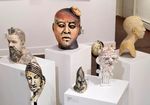SPA's 'Face It!': Artists take off our masks - for a moment
←
→
Page content transcription
If your browser does not render page correctly, please read the page content below
Visual Arts Review SPA’s ‘Face It!’: Artists take off our masks — for a moment The Times Argus/Rutland Herald By Mary Gow Arts Correspondent, published Feb 5, 2022 James Rauchman: “Photo Repair,” Jeb Wallace-Brodeur / Staff photo We see eyes above masks, sometimes an expressive brow, but it’s been a long time since we have seen faces — faces of people we know, people we don’t know, faces in a crowd. For those of us longing to see faces again, Studio Place Arts has the answer. “Face It!” a group exhibition featuring 35 artists opened last week in SPA’s Main Floor Gallery in Barre. Faces fill the gallery — faces of artists, faces of friends, faces you might see at the Tunbridge Fair, faces of activists, abstract faces, faces of children, faces of people from around Vermont and beyond.
Each one, with its unique features and expression, invites us to look at them and savor face-
to-face time.
In SPA’s Third Floor Gallery, “Call and Response” features collaborations between eight
Vermont photographers. A project conceived in the social isolation of 2020-21, the exhibit
offers visual conversations between photographers’ images.
The Second Floor Gallery features new digital images by Ned Richardson in “What the
machines told me.” Building on his explorations of the connection between forest and
technological networks, Richardson focuses on narrative, signaling and scale as well as
learning and perception in this latest body of work.
“It is so wonderful to be able to see faces. People come in and just breathe it in. It’s like
you’re a hungry person and this is food,” explains Janet Van Fleet, who co-curated “Face It!”
with fellow artist Michael Ridge.
“They’re all very wonderful faces — different ages, different ethnicities, in different media,”
she said. “We have things made out of leaves, and drawings and paintings and photographs
and carvings.
Sculptures from various artists in the “Face It!” show at Studio
Place Arts, Jeb Wallace-Brodeur / Staff photo
Charles Lysogorski: “Portrait #158,” Jeb Wallace-Brodeur / Staff
photoAgathe McQueston: “Siouxsie,” Jeb Wallace-Brodeur / Staff photo “It’s like being in a party,” Van Fleet said. “Some people are more closely related than others; some have relationships that are pre-existing, some are meeting for the first time.” The expressive face of the late G. Roy Levin, the founder of the low residency Masters in Fine Arts program at Vermont College, engages with viewers as though in the midst of a fascinating conversation in four hand-pulled photographs from 2000 by Andrew Y. Kline. Right next to Levin, in a 2014 oil pastel, “Andrew Kline,” Kline the artist looks directly at the viewer, one eyebrow arched, in an oil pastel by Ed Epstein. A few feet away, in the gallery’s group of self-portraits, Epstein himself appears. In this 2021 charcoal, he peers down into the gallery through his glasses in “Selfie.” “Chicken Boy,” Jack Rowell’s delightful photograph taken at a poultry exhibition at Tunbridge Fairgrounds in 2016, captures a moment with a young man holding a beady-eyed fowl in his hands. The boy wears a knitted chicken hat with yellow beak and bright red comb. Rowell’s amiable looking “Woman in Red Hat,” also from 2016, beams from under her broad-brimmed scarlet chapeau, looking back across the room at the boy.
In an especially powerful pairing, Larry Bowling’s 2022 oil, wax and collage “John Trudell and
the True History of Broken Promises, Broken Bodies and Broken Spirits” hangs next to Ann
Young’s miniature oil on canvas portraits. Trudell, an Indigenous American author, poet,
actor, musician and political activist, who died in 2015, dedicated decades to drawing
attention to the United States’ failure to honor treaties with Indigenous peoples and to the
cultural and physical assaults on them, and at great personal cost. Young’s beautiful small
portraits, introduce us to nine individuals of a range of diverse cultures.
Along with the uplifting energy of all these exposed faces, SPA’s Main Floor Gallery itself has
its own new pep. The gallery walls have long been a muted beige-tan color. SPA Executive
Director Sue Higby has given the gallery a fresh look — bright white walls show off “Face It!”
and welcome other exhibitions coming to SPA in 2022.
Ann Young: “Untitled Portraits,” Jeb Wallace-Brodeur / Staff photoThere is a lot to experience in SPAs upstairs galleries as well. Richardson works with artificial
intelligence and coding in his work in “What the machines told me,” with its digital prints and
series of prints.
Richardson’s digital images in “What the machines told me …” were generated using
Generation Adversarial Network (GAN), modeling that uses deep learning methods. This
exploration began, Richardson explains in his artist’s statement, “after perceiving a
connection between the forest networks which surround my home and the digital networks
that surround our lives.”
Ned Richardson: “untitled,” Jeb Wallace-Brodeur / Staff photo
The Third Floor Gallery’s “Call and Response” is much like a visual version of a word
association game between pairs of artists who are members of The Photographers
Workroom. One photographer sends an image to another. The second responds with a
connected image of their own — perhaps linked by color, shape or subject.For example, Kent Shaw sent a photograph of a snowman to Rosalind Daniels. Daniels then sent a photograph of twigs in the snow to Shaw — they reminded her of Frosty’s arms. Shaw responds with a stand of leafless trees in winter. Further along the way, red twigs lead to colorful twisted wires. The series are laid out in delightful horizontal and vertical conversations. Lisa Dimondstein and Rosalind Daniels, Jeb Wallace-Brodeur / Staff photo Mary Gow: mgow@gmavt.net
You can also read
























































